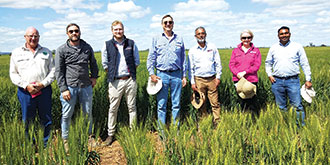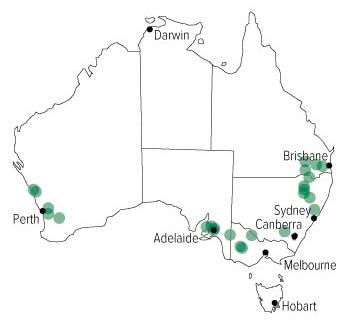Collaborative international efforts underpinned with the latest analytics are boosting the breeding pipeline for Australian cereal varieties.
Australian plant breeders require access to diverse genetic resources to develop new and improved crop varieties with desirable characteristics for both yield and disease resistance for evolving Australian farming systems and markets.
Collaborations with institutions such as the International Maize and Wheat Improvement Center (CIMMYT) in Mexico and the International Center for Agricultural Research in the Dry Areas (ICARDA) in Morocco have partly met this need for Australia.
Established in 2007, the GRDC-supported project – CIMMYT Australia ICARDA Germplasm Evaluation (CAIGE) – selects, imports and evaluates bread wheat and durum germplasm in Australia.
Since 2013 it has included bread and durum materials from ICARDA as well as barley. Cutting-edge analytics are now more precisely targeting material of value.
The program maximises value for Australian growers by leveraging international investment in wheat and barley breeding.
Coordinated by the University of Sydney, it comprises two components – wheat, led by the University of Sydney’s Professor Richard Trethowan, and barley, led by Associate Professor Mark Dieters (formerly from the University of Queensland). Dr Julie M Nicol coordinates the CAIGE program, with Dr Amit Singh managing the website and database.
CAIGE is a multi-stakeholder project with two international partners, nine Australian commercial breeding companies and eight public sector institutions, all benefiting from the program.
Process
Dr Nicol says Australian breeders evaluate and select promising lines for specific traits during visits to international centres – CIMMYT in Mexico (for bread and durum wheats) and ICARDA in Morocco (for bread, durum wheat and barley). The lines are inspected in the field, and the data (phenotypic and genotypic) is evaluated in collaboration with international scientists.
 Breeders from CIMMYT and Australian agencies visiting a bread wheat CAIGE yield trial in Balaklava, South Australia run by CAIGE collaborator LongReach Plant Breeders in 2022. Left to right: Damien Scanlan, Brett Lobsey, Mitchell Englinton, Richard Trethowan, Harpreet Gill, Julie Nicol and Velu Govindan. Photo: Courtesy Julie Nicol, CAIGE
Breeders from CIMMYT and Australian agencies visiting a bread wheat CAIGE yield trial in Balaklava, South Australia run by CAIGE collaborator LongReach Plant Breeders in 2022. Left to right: Damien Scanlan, Brett Lobsey, Mitchell Englinton, Richard Trethowan, Harpreet Gill, Julie Nicol and Velu Govindan. Photo: Courtesy Julie Nicol, CAIGE
“Selected bread wheat lines are also phenotyped using one of the global phenotyping platforms to narrow selections for Australian evaluation,” Dr Nicol says.
“Imported lines undergo genotyping and seed increase with Agriculture Victoria-Australian Grains Genebank in Horsham, and are then multiplied post-quarantine at the University of Sydney in Narrabri.
“Final selections are made based on additional data from the international centres and then – in collaboration with commercial breeding programs – yield trials are planted across the Australian grainbelt and assessed for disease resistance with our public partners.”
Statistical evaluation of the field trials was provided in the past by the GRDC-supported Statistics for the Australian Grains Industry and in the past year by GRDC’s new Analytics for the Australian Grains Industry, supportedby Dr Vivi Arief from the University of Queensland.
 Figure 1: Map indicating CAIGE field trials for bread (38), durum wheat (13) and barley (15) over the three-year period 2021–23. There were 1815 ICARDA and CIMMYT lines tested. Source: CAIGE
Figure 1: Map indicating CAIGE field trials for bread (38), durum wheat (13) and barley (15) over the three-year period 2021–23. There were 1815 ICARDA and CIMMYT lines tested. Source: CAIGE
“We are developing an automated pipeline to analyse the Australian CAIGE field trials for both a single-year analysis and a more-reliable three-year analysis,” Dr Arief says. “We are also designing the field trials.”
“The analysed results are provided to all collaborators and they can interrogate the data using an interactive R shiny app- a web-based app. The pipeline and the app can be applied to other similar projects.”
Over the past 10 years, 5747 bread wheat, 2631 durum wheat and 2057 barley materials have been imported and subsets tested around Australia in 196 different trials.
Outputs for growers
The private sector breeding partners each year select promising lines from CIMMYT and/or ICARDA to use in their breeding programs. Many Australian varieties have been released with either CIMMYT or ICARDA lineage over the years.
In addition, straight variety releases from CIMMYT have already occurred, including the bread wheats Borlaug 100 , Rebel Rat and Rebel 65 (all licensed to Rebel Seeds) and Jumbuck (licensed to InterGrain). This highlights the importance of international collaborations in improving crop yields and disease resistance in the face of evolving production challenges.
More information: Dr Julie M Nicol, Julie.nicol@sydney.edu.au , Dr Vivi Arief, v.arief1@uq.edu.au

























































